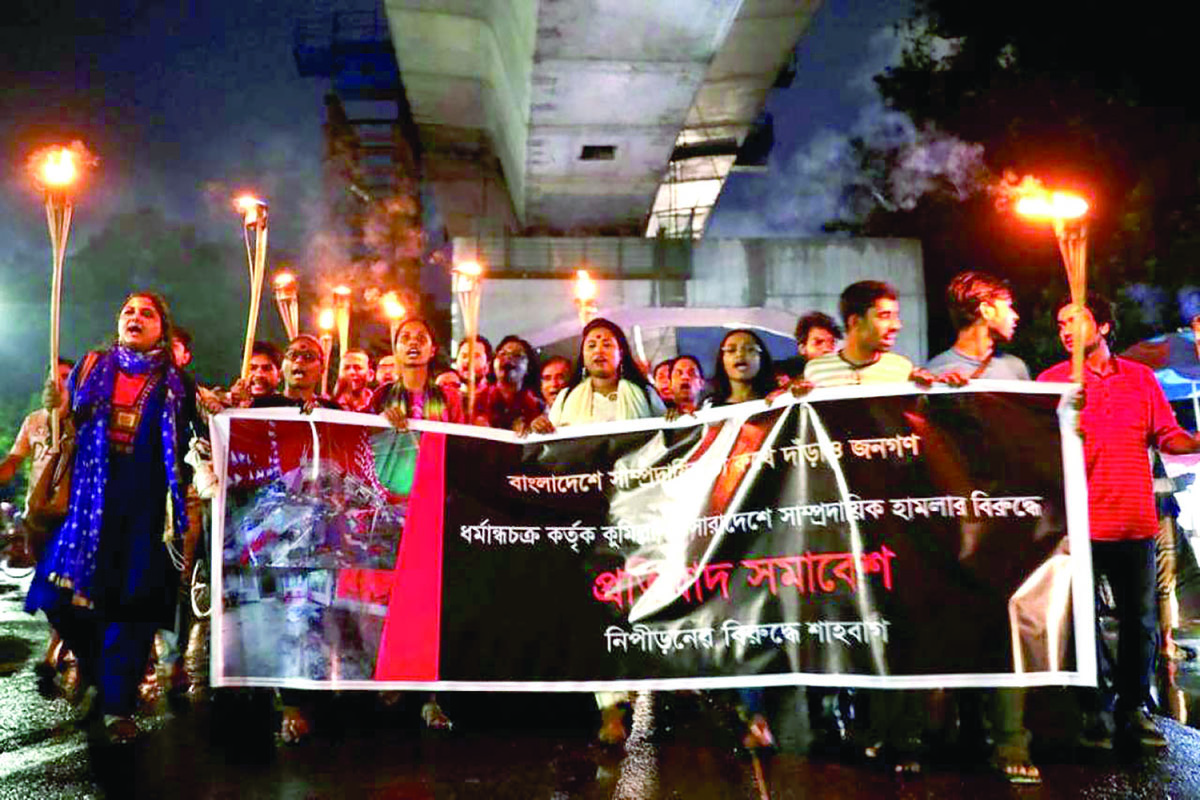Forgotten heroes
Ullaskar suffered immensely after being caught by the British and was sent to the Cellular jail in the intractable Andamans.
The situation is still of an uneasy calm raising fears of more attacks on the Hindus. Further, emboldened by the fact that the perpetrators got away with such stark defiance, other districts in Bangladesh fear that Hindus may be targeted, and their properties attacked in the days to come.

Photo: SNS
It is ironic that this year when Bangladesh is celebrating the 50th year of its independence as well as the birth centenary of its founding father, Sheikh Mujibur Rahman who laid the foundation of a secular republic, the country failed to ensure a trouble-free Durga Puja for its substantial Hindu minority.
Most unfortunately, this year it was the fanatics’ writ that ran most brazenly. At least 70 puja pandals were vandalised, places of worship desecrated and during the mindless violence unleashed by the Islamic radicals, several lives were lost, hundreds were injured, and Hindu properties destroyed through arson and blatant use of force.
More lamentably, the police, the elite Rapid Action Batallion (RAB) and the Border Guards Bangladesh (BGB) proved utterly ineffective. It is equally sad that the assertive assurance of a secular leader like Prime Minister Sheikh Hasina’s on 14 October – to hunt down the perpetrators who violently targeted the Durga Puja pandals – fell on deaf ears and there were repeated incidents of intolerance and vandalism. It, therefore, appears that things have gone out of control from the point of view of law and order and intelligence machineries.
Advertisement
This assessment is buttressed by the latest tragic happenings on October 16 when the south-eastern town of Feni saw renewed attacks on several places of Durga worship. Even Kali temples as well as Hindu shops and property were not spared. The enforcers of law used tear gas shells and resorted to firing but the irate mob maintained their fury, with scant respect for the uniformed and heavily armed personnel. This aspect cannot be ignored.
The situation is still of an uneasy calm raising fears of more attacks on the Hindus. Further, emboldened by the fact that the perpetrators got away with such stark defiance, other districts in Bangladesh fear that Hindus may be targeted, and their properties attacked in the days to come.
Judging from these unfortunate occurrences that have created fear and uncertainty, it would seem that secularism in Bangladesh will have to live with this stigma, when not even civil society, academics and liberals could do much to prevail upon Islamic fundamentalists who are quite clearly calling the shots.
They are perhaps doing so perhaps as part of a larger conspiracy to a) try and destabilise the Hasina-led government; b) drive a wedge between India and Bangladesh as the pro-Pakistan and anti-India elements are desperate to target India because they perceive an affinity between India and Bangladeshi Hindus, and c) try and establish a sense of Islamic supremacy following the Taliban victory in Afghanistan.
In this light, the worrying factor remains that if Sheikh Hasina’s administration is unable to rein in these jihadi forces, then in her absence, should that come about, Bangladesh may slip back to the darker days of the Bangladesh Nationalist Party (BNP) and Jamaat e Islami, possibly encouraged by Pakistan. As is well known, this political partnership had ensured in its successive regimes an anti-India and pro-Pakistan stance and severely dented the secular credentials of the 50-year-old nation. Hence, this challenge is daunting and calls for tough and deft handling.
In light of these developments, Sheikh Hasina’s reported statement of October 14 appealing to India to ensure that religion is not used divisibly needs to be read in all seriousness. The Bangladesh leadership must know that the situation arising out of the fresh attacks on Durga Puja spots and the Hindu community is not merely a law-and-order problem. They go much beyond what seems immediately apparent.
Another point must be noted. India-Bangladesh ties are on a firm footing today. They must not, at any cost, be allowed to derail. This requires those at the helm in India to walk a tightrope and display both political maturity and delicate handling. The alternative is daunting.
The writer is an old Bangladesh watcher, a security analyst and a former National Security Advisor to the Prime Minister of Mauritius. The views are personal.
Advertisement